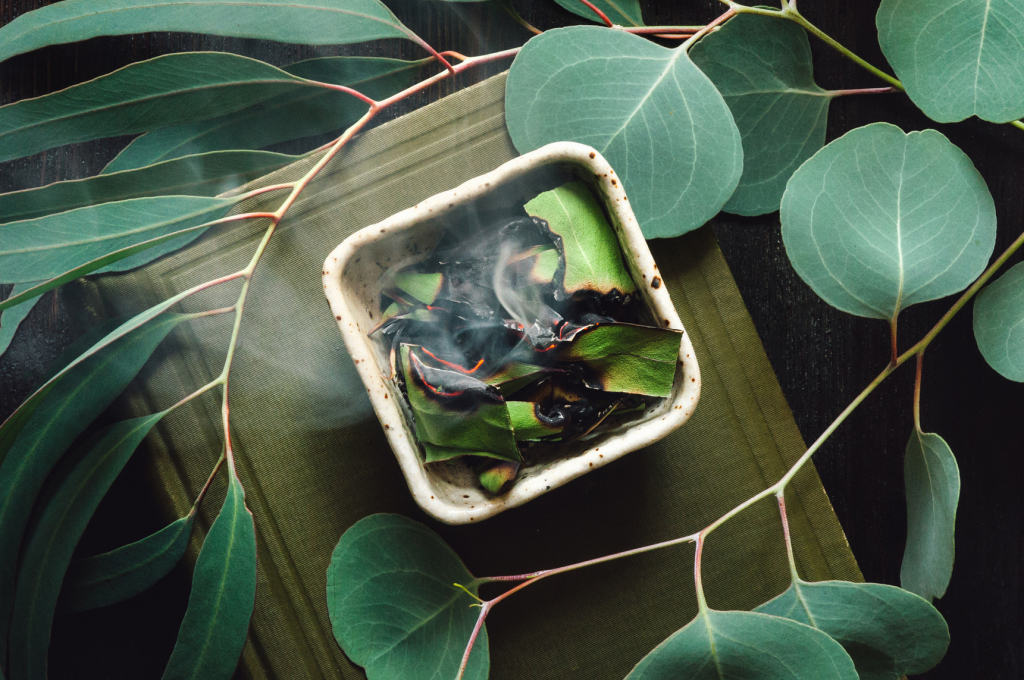
Eucalyptus leaves are more than just koala food. If you’ve ever smelled this plant, the aromatics really stick in your memory – it’s bold, refreshing, vibrant, and opening. After one inhale, you almost immediately feel that your breath is deeper and your spirits lighter. Eucalyptus is well-known as one of the best aromatic plants for relieving cold and flu symptoms and providing respiratory system support.
But did you know there are actually many different ways to use Eucalyptus? In this article, you’ll deepen your plant knowledge and learn all about the history and folklore of this dynamic plant, plus 5 dynamic ways to put it to use, and the many different health benefits it has to offer.
History and Folklore of Eucalyptus
There are about 700 species of Eucalyptus trees found all over Australia, New Guinea, and Indonesia. It’s an evergreen tree, with the exception of a few species, that grows anywhere from 2-200 feet high! This fast-growing, drought-resistant tree has the miraculous ability to quickly regenerate itself after being damaged by wind, wildfire, animals, or humans [1].
The Eucalyptus tree is a large part of Australian culture; the Aboriginal Australians used them to make tools, shields, canoes, musical instruments, dishes, and more. The leaves have a high content of 1,8-cineole, a monoterpenoid also known as Eucalyptol, which contributes to a large portion of its health benefits [3]. On warm days in Australia, the essential oils on the leaves are vaporized into the surrounding atmosphere, creating a magical blue mist. This thick, fragrant haze created inspiration for the name of the Blue Mountains in Australia.
The tree was introduced from Australia to the rest of the world in the 1700s. Since then, many different forms of Eucalyptus have been used by almost every culture. Today, the leaves are most commonly harvested for essential oil distillation, but many still harvest and use the leaves for incense and other forms of traditional herbal medicine. Let’s explore the many different benefits of Eucalyptus and how best to access them.

Top 5 Eucalyptus Health Benefits
Historically, Eucalyptus has been used in a wide-range of medicinal ways to access its many different health benefits, including (but not limited to) incense, essential oil, tea, hydrosol, herbal steam, and topically. Each application offers a similar yet sometimes slightly different set of health benefits.
Eucalyptus Benefits for the Lungs
Eucalyptus leaves have long been used in Buddhist, Hindu, and Chinese incense recipes for their revitalizing, menthol-like aroma. The intoxicating aroma is believed to help clear sinuses and promote healthy breathing function [1].
The leaves have been used across many different cultures in herbal medicine protocols. They’ve been traditionally used by Aboriginal Australians for their antiseptic and astringent properties as a decongestant and expectorant to relax mucous membranes, open the chest, clear the airways, and reduce the chance of infection in the lungs [1].
In Traditional Chinese Medicine, it’s commonly used to clear lung phlegm and address many respiratory conditions like bronchitis, asthma, and sinusitis, and other issues that relate to congested airways, from the nostrils to the lungs [1].
Today, Eucalyptus is a common ingredient in many throat lozenges and sprays, cough suppressants, decongestants, and topical chest rubs like Vicks VapoRub. Several research studies suggest that the aromatics provide relief for cold and flu symptoms and other similar respiratory issues due to the anti-inflammatory and anti-oxidative properties of the high amounts of Eucalyptol found in the leaves [2][3].
Ways to Use Eucalyptus for the Lungs
- Incense
- Essential oil diffuser
- Herbal steam
- Topical chest rub
Eucalyptus Benefits for Immunity
Eucalyptus tea is rich in antioxidants, including catechins, luteolin and quercetin, which have been shown to have neuroprotective properties and help relieve oxidative stress. Plants high in antioxidants are believed to help protect against serious health concerns and boost the immune system [2].
The aromatics have also been shown to help boost the immune system. According to a study published in BMC Immunology, the essential oil can help increase the body’s white blood cell count, providing support for the immune system [4].
Ways to Use Eucalyptus for Immune System Support
- Tea
- Incense
- Essential oil diffuser
Unlock Your Free Issue Of...
🌿 The Aromatic Medicine Garden Membership 🌿
Are you ready for a deeper, holistic dive into the world of aromatic plants? See what our membership is all about with your free sneak peek issue, including an hour-long plant talk and a 21-page plant monograph pdf.

Eucalyptus Benefits as a Disinfectant
Due to its antibacterial, antiviral, anti-fungal, and anti-infectious properties, Eucalyptus incense smoke has been traditionally used by many cultures to purify the air and prevent sickness [1].
In the 1800s, Eucalyptus gained popularity in hospitals for its potent antiseptic properties. It was often used to sterilize patients and surgical tools for surgery and other operations. In the beginning of the 20th century, some European hospitals started incorporating the use of Eucalyptus oil for keeping almost everything clean and sterile [1].
Due to its antiseptic and cleansing properties, Eucalyptus can be found in different oral hygiene products and mouth rinses to freshen breath and promote overall oral health [2]. It’s also a common topical remedy for wound healing, overall skin health, and fungal infections [1].
Ways to Use Eucalyptus as a Disinfectant
- Incense to purify air
- Essential oil diffuser to purify air
- Topically: Salve, ointment, spray, or diluted essential oil in carrier oil to apply to body
- Topically: Dilute essential oil in water and/or vinegar to apply to surfaces

Eucalyptus Benefits for Mental Clarity and Stress Relief
Eucalyptus aroma is known to be refreshing and energizing; it is traditionally used to promote mental clarity, help reduce mental fatigue while bringing stimulation and inspiration to the spirit [1]. Studies suggest that the high amount of Eucalyptol in the aromatics can help reduce stress and anxiety [2].
Ways to Use Eucalyptus for Mental Clarity and Stress Relief
- Incense
- Essential oil diffuser
- Herbal steam
Eucalyptus Benefits for Pain Relief
Eucalyptus has been traditionally used to address pain ranging from common muscular pain to arthritic and rheumatic conditions. It can help reduce body aches and stiff joints when used topically in a salve or ointment [1]. Several studies have also suggested that the aromatics can help decrease pain and depression levels [2].
Ways to Use Eucalyptus for Pain Relief
- Incense
- Essential oil in diffuser
- Topically: Salve, ointment, spray, or diluted essential oil in carrier oil to apply to body
Precautions
It’s generally recommended to consult a health care professional before using any herbal remedies, especially if you’re taking prescription medication.
Due to toxicity, never ingest fresh Eucalyptus leaves – save those for the koalas [2]. Never ingest essential oil; their highly potent nature is irritating internally. When preparing Eucalyptus tea, use dried leaves only.
Topical application of Eucalyptus may cause skin irritation in some people – always dilute an essential oil with a carrier oil before applying to skin. Never apply an essential oil directly to your body.
Eucalyptus and Beyond
There are countless ways to use Eucalyptus and so many reasons to have it stocked in your herbal medicine cabinet. A multi-faceted plant like Eucalyptus is great to have on hand since it can address a wide-variety of health concerns: colds, flus, respiratory ailments, pain, stress, anxiety, mental clarity, disinfection, and immune support. Hopefully, after reading this article, you feel inspired to explore incorporating Eucalyptus in its many forms into your life.
EUCALYPTUS
Latin Name: Eucalyptus radiata, E. globulus, E. smithii, E. polybractea
Other Common Names: Blue Gum, Fever Tree, Gum Tree, Australian Fever Tree, Tasmanian Blue Gum, Mallee, Stringy Bark tree
Plant Family: Myrtaceae
Parts Used: leaf
Herbal Energetics & Actions: antibacterial, anti-fungal, anti-infectious, anti-inflammatory, anti-rheumatic, antiseptic, antispasmodic, antiviral, astringent, circulatory stimulant, decongestant, diaphoretic, diuretic, expectorant, immune tonic
Body Systems Affiliations: respiratory, immune, circulatory, muscular, skin
Aroma: fresh, camphoraceous, minty, spicy, clear, balsamic, herbaceous, slightly sweet

Dive into the ancient world of aromatic plants with the Materia Aromatica ebook, an in-depth guide to the therapeutic, spiritual, and aesthetic uses of the world's favorite incense plants. This rare resource offers detailed plant monographs and explores how incense has been used across cultures for healing, ritual, and pleasure for ages.
Article Written By Melissa Szaro

References
- Sylliaasen, Evan. (2019). Materia Aromatic ebook. Chimacum, WA: The Northwest School of Aromatic Medicine.
- Chamberlain, C. (2021). 10 health benefits of eucalyptus leaves, backed by science. Retrieved from https://www.netdoctor.co.uk/healthy-living/wellbeing/a36196396/eucalyptus-leaves/
- Shao, J., Yin, Z., Wang, Y., Yang, Y., Tang, Q., Zhang, M., ... Lu, J. (2020). Effects of different doses of Eucalyptus oil from Eucalyptus globulus labill on respiratory tract immunity and immune function in healthy rats. Front. Pharmacol. Retrieved from https://doi.org/10.3389/fphar.2020.01287
- Serafino, A., Vallebona, P.S., Andreola, F., Zonfrillo, M., Mercuri, L., Federici, M., … Pierimarchi, P. (2008). Stimulatory effect of Eucalyptus essential oil on innate cell-mediated immune response. BMC Immuno; 9: 17. Retrieved from https://www.ncbi.nlm.nih.gov/pmc/articles/PMC2374764/
© 2021 The Northwest School of Aromatic Medicine. All rights reserved.
*The statements above have not been evaluated by the FDA, and are for educational purposes only. This article is not intended to diagnose, treat, cure, or prevent any disease. This article should not be taken as medical advice. Please consult your physician before you use this information for health purposes.
